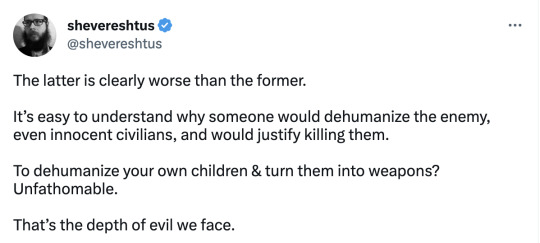#Israel-Palestine conflict
Text
The Israel & Palestine War
First of all I want to say:
I support the Palestinians who want peace.
I support the Israelians who want peace, and speak out against or towards their government to stop their oppression and find a compromise to achieve peaceful resolutions for both sides.
However -
The amount of people defending the kidnapping, hostage taking, the slaughter of innocents & children - especially if they're Jewish, along with the RAPE of the women kidnapped & pulled from their cars, homes, vehicles, birthday parties, raves and other places is disgusting.
Out of the tourists and relatives of those, deaths aside – All those who speak of the extreme hostage situations or utmost vile acts imposed upon them (rape, murder of their family, being hunted etc) only speak of the Hamas terrorists taking them & doing such ... Which is a very, very dumb play to make from a strategic point of view ... Like, did they not consider - To stop and think, how countries are gonna retaliate when they see their citizens taken hostage or terrorised by a foreign armed force?
Jews are slaughtered, raped and tormented.
Queers are slaughtered, raped and tormented.
Innocents who just want to live their lives are slaughtered, raped and tormented.
This isn't opinion, or propaganda - This is fact. There's mountains of evidence at this point in time to demonstrate such, along with even admitted or outright posted by the terrorisers themselves via media outlets who're cheering and bragging about it.
The extremists of the war & the Hamas supporters can bang their chest and say “Who cares? We are the best!” or some other self-justifying BS excuses – but when they have half the world raining down on them to take vengeance in the name of their kin, they’re going to quickly realise just how large the world actually is – and how truly small they are.
“The silent killer of great countries and civilisations of high achievement – is hubris.”
“The whole problem with the world is that fools and fanatics are always so certain of themselves, and wiser people are so full of doubts.”
#Israel#Palestine#Free Palestine#Support Israel#Hamas#Social Justice#Jewish#Anti Semitism#Israel VS Palestine#Queer#War#Peace#Israel-Palestine Conflict
127 notes
·
View notes
Text
If a people is indigenous to an area, then by definition, that people’s state cannot be a settler-colonial state
79 notes
·
View notes
Text
OK, so I've been seeing MULTIPLE posts on my dash about Palestine and I'm thinking, "Yeah, but what about Ukraine? Don't any of us still care about them?" Keep in mind that Russia and Iran are allies.
#Ukraine#Russia#Russian invasion of Ukraine#Russo-Ukrainian War#Volodymyr Zelenskyy#Zelenskyy#Vladimir Putin#Vlad Putin#Putin#Israel#Palestine#Gaza#Israel-Hamas War#Israel-Hamas conflict#Iran#war#conflict#Israel-Palestine conflict#current events#human rights#I personally think that Russia is far more dangerous than Israel but that's just me
26 notes
·
View notes
Text
Old numbers but still relevant otherwise
#palestine#free palestine#save palestine#gaza#free gaza#save gaza#Israel-Palestine conflict#history#world news#important#current events#infographic#information#middle east
22 notes
·
View notes
Text
Stop Talking About "Proportional Responses" and Read This.
Okay. So as an Intelligence Studies student who has had a longstanding special interest in the Middle East, I feel a little bit compelled to talk about the Israel-Hamas-Palestine situation going on right now.
First off, there are tons of great resources to learn about the history that pertains to this conflict. I highly recommend the book The Contemporary Middle East, 3rd edition, for a good start, but for those of you who don't learn well through reading, Warographics has a great short video that can help you get the bare minimum bit of context necessary to understanding what's going on.
Secondly, it is paramount to note that there are no good guys in this situation aside from the civilians and non-combatants whose lives are being horrendously upended (again) by this conflict. Anyone who tells you that either Israel or Hamas is the sole hero or the sole victim in this story is not looking at the full picture. The world is made up of shades of gray, and there is no truthful black-and-white view of this situation. I caution anyone against listening to those who make statements that glorify the actions of either party or who refuse to accept that both have committed atrocities over the past decades preceding this particular event and the days containing it or who equivocate Palestine with Hamas.
Third, my personal bias is against the use of egregious violence, shock tactics, and ethnic cleansing in any efforts to effect lasting change. I am also against the apartheid state model, the definition of which can be found at this hyperlink. I stand against any form of extremism and terrorism, be they enacted on behalf of an individual, a group, or a recognized state. If you are a proponent of these things, you will not like my analysis. I also assert that LOAC should be staunchly adhered to, not just in letter but also in intent. If you think that exceptions to LOAC should be made to religious or ethnic groups, you will not like my analysis. I do not believe in making exceptions for "divinely inspired" behaviors and I harshly disagree with the assertion of some Christians that Israel reserves the right to reign unfettered damage on any and all others because they are the "apple of G-d's eye."
Fourth, I don't believe in the principle of "reciprocal action" for nations that are actually seeking peace. Responses to terrorist behavior should not be met with equal terrorist behavior. War should not be an avenging action, it should be an procedure that seeks to end the conflict with as little collateral damage as possible. Counter to what most US Americans seem to believe, war is not just bombs and guns. It is ISR, agreements, support, appeals to other countries for aid, international propaganda campaigns, cybersecurity efforts, counterintelligence, economic shifts, and a lot more, all of which has become tremendously more accessible (and impactful) thanks to technological advances. Throwing bodies at the problem and throwing bombs at the bodies until enough people die that it slows down or stops is not our only option anymore, and it hasn't been for a long time.
Finally, I strongly believe in the responsibility that journalists and reporters bear to inform their viewers. Does the average US American news viewer understand Israel's defense capabilities? No, and I wouldn't expect them to. But it's helpful for them to know, when forming their opinions about the conflict. Instead of only showing the tragic final moments of Palestinian and Israeli civilians on loop for the entire 24 hour news cycle, why not dedicate some of that time to discussing the armaments and capabilities of each side of the conflict? What missiles are being used in the air strikes? What about the aircraft? What is the method that the IDF is using to decide where to strike? It's not sensational, but it is important.
Okay so now that that's all out of the way, let's talk specifically about Israel's response to Hamas' coordinated attack on its citizens on 7 October 2023.
My thesis statement here is this: Israel has the knowledge and means to locate and deal with the most important/influential members of Hamas who reside in Gaza while sustaining minimal collateral damage to buildings and civilians, but they have chosen instead to inflict a moderate amount of collateral damage -- more than they have in the past, but less than they are capable of. To what end? That is yet to be seen, though inferences can be made.
In my opinion, this is reckless and will only serve to stoke the flames of anti-Israel sentiment in Palestine and around the world while appealing to the radicalized far-right fringe groups Netanyahu is beholden to, as well as radical Christians, Messianics, and Zionists in the United States. It will not result in peace and will further divide the Middle East and the US along archaic religious extremist lines.
The following post will provide the puzzle pieces that support this hypothesis, and bring them all together in a conclusion.
Let's start by talking about Israel's intelligence apparatus, Mossad. Background on Mossad here for those who need it.
Why is everyone upset with Mossad? Mossad is actually one of the most effective intelligence agencies in the world. The fact that they didn't catch this before it happened comes as such a shock to me as an analyst-in-training that I actually think they may have allowed it to happen in order to enact a war on Palestine. That's simply my impression, but we have yet to see evidence of why this attack was not caught and stopped. The IDF's actions seem to back my hypothesis, but we won't know for sure until the dust settles years from now. At this point, I don't feel speculation is particularly useful.
What benefit does Mossad have to offer now that the conflict has popped off? Hamas is a large organization, estimated at around 20,000 individuals. However, Mossad likely has profiles (and possibly even patterns-of-life) on the high ranking and influential members of Hamas who reside in Gaza. This is because Mossad is a highly adept, globally notable intelligence service, and Hamas is a well-known enemy. Even if Mossad does not have profiles on those individuals, it would only take some patience on Israel's part to locate and identify them and their patterns of life, especially given Israel’s UAV capabilities.
What are Israel's UAV capabilities?
Israel's use of UAVs is not publicly acknowledged, but it is well known that they not only use but manufacture three specific UAVs. In fact, they are one of the world's foremost suppliers of UAV technology.
Of these, the Hermes 900 and Heron TP most resemble the MQ-9 Reaper. Why is this important? Comparison. The MQ-9 Reaper has hella capabilities I won't go into here, but follow this link if you'd like to learn more about the technological marvel that is General Atomics' MQ-9B. What you need to know for this comparison is that the MQ-9 can surveil and destroy a target without that target even knowing the MQ-9 was there. It's stealthy and incredibly precise. The US DOD version has a suite of sensors for all kinds of tasks, and it can carry a decent payload, which is addressed in the next bullet.
The missile we'll be talking about today is the November-class Hellfire. These 104 lb missiles have a unique capability. They are often called a zero-collateral weapon, because they eliminate their target(s) and nothing else. The short of how this missile works is by pressurizing an enclosed space and liquifying what's inside it. This missile does not explode because it has no explosive material. That means no shrapnel, no molten metal, nothing. And, its effects are confined to the four walls, floor, and ceiling of the room it "detonates" in. People in the next room? Unharmed. And it will not pressurize an open space. Which means, by using the laser guided air-to-ground missile system mounted on an aircraft like the MQ-9 or similar, this missile can be deployed to hit one target in an open space and impact no one else. Once deployed, the missile will make impact with the target, destroying it via sheer velocity, bury itself in the ground, and detonate without harming any other people or structures.
So how would Israel get their hands on something like that?
Prior to the Hamas attacks, the Biden administration requested Israel receive $3.3 billion in foreign military financing for the upcoming fiscal year -- the same as the past three years. For comparison, $2.8 billion is going to Europe and Eurasia aid, with an additional $1 billion earmarked specifically for Ukraine. The DOD version of the MQ-9 Reaper costs about $32 million, and Hellfire missiles cost around $120,000 per, including costs for technical support and training -- and its many variants are compatible with multiple platforms, not just the MQ-9.
For context, the Hellfire missile was initially developed in the late 70's. Its newer iterations are much more elegant and efficient, but the point still stands that Israel has had access to the same technology for just as long as everyone else. So even if they were not receiving funding from the US, Israel likely already has figured out an equivalent tool.
Now that we know what the most effective, least damaging option is... what kinds of missiles is Israel using?
Right now, since explosives are still flying, we won't have that information. But we do have information about the last big barrage of missiles and bombs used by Israel on Gaza, back in 2021.
Gravity bombs (mark 82, 83, and 84) fitted with JDAM guidance kits (GBU-38, GBU-32, and GBU-31 respectively) giving the weapon the capability to hit a designated GPS coordinate. These are general purpose bombs built to penetrate concrete and then explode, spreading lethal shrapnel. Lethal area: 2,400 m2
2,000 lb GBU-31 (V)4/B (bunker-buster subvariant), used to level high-rise buildings in Gaza.
500 lb GBU-54 'laser-guided JDAM.'
Semi-active laser-guided Mikholit missile (ATGM). These small missiles can be carried by the smallest of the UAV, but are often deployed by helicopter.
"Spike" or Tammuz NLOS anti-tank missile, which in some models has a staggering range of 16 miles, features a built-in video feed, and can be controlled like a drone.
So... they don't seem to have a track record for using precision missiles that cause minimal collateral damage. Okay, well maybe they have a reason.
So where is Israel sending its explosives?
Gaza is the world's third most densely populated polity, with a population of over 2 million Palestinians -- 70% of those being refugees from other parts of Israel. Below are two maps. The first one shows the population density using dots to depict the general clustering of humans in Gaza. The second one shows the IDF airstrike locations. There is a citation in the image itself, but the hyperlinks in this paragraph take you to the same places. I will let you draw your own conclusions regarding the impact the bombs will have on the Gaza Strip populous, based on the impact locations and population clustering.
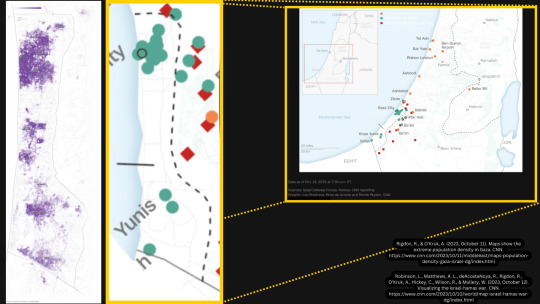
From here, it is important to address the considerations that go into what missile to use on a target.
There is generally a three-point system that helps determine which munition is necessitated by which mission and which targets.
Value of target
Missile capability
Estimated collateral deaths
These are all important because of the Law of Armed Combat, sometimes called the International Humanitarian Law, or the Law of War, which is backed by both the Geneva Convention and the Hague Convention. The intention of the LOAC is to minimize collateral damage and unnecessary death, especially to that of non-combatants. And yes, it does apply to "non-international conflict" i.e. engaging in conflict with non-State armed groups -- but it offers a unique exception. "Leaders of non-State armed groups are also subject to attack on the same basis as other members of the group." See subsection 5.7.4 of the DOD Law of War Manual. But that's a rabbit hole for a different day.
How effective was the 2021 bombardment on damaging or destroying Hamas assets?
This is important because the current bombardment is on trajectory to be much more deadly and costly than any IDF bombardment in the past. If the goal of Israel's bombardments is to stop Hamas, then the damage to Hamas should outweigh the damage to the civil Palestinian population. When reading these records, remember that Hamas has controversial political control over Gaza -- many Palestinians do not want Hamas as their governing body, but Hamas enacts legal power there anyway.
Most of the boats and many of the personnel of Hamas' naval cammando force were destroyed
10 Hamas government buildings, including its Interior Ministry, were destroyed
11 military buildings, including one housing Hamas' cyber branch, were destroyed
Five banks that were allegedly linked to Hamas were destroyed
"Nearly 30" (yes, that's the quote) senior commanders and one rocket engineer expert were allegedly killed
The family homes of at least 15 Hamas leaders were destroyed, some including the families inside
Over 60 miles or roughly 20-25% of Hamas' estimated 250-310 mile "Metro," which is an underground tunnel system -- the demolished area included 15 cross-border strike tunnels
Let's compare that to the impact of those same strikes on Gazan infrastructure and non-combatants.
Gaza's only COVID testing and vaccination center was destroyed
Gaza's largest bookstore was destroyed
A critical desalinization plant was disabled
The sewer system was rendered unusable -- reportedly 50% of the water pipeline network was destroyed
53 school buildings were damaged
11 health centers and 6 hospitals were damaged
17,000 residential and commercial units were damaged, including 5 residential towers
An estimated 72,000 Palestinians were rendered homeless
800,000 Gazans lacked access to clean drinking water and were receiving 5 hours of electricity per day, down from 12
At least 243 Gazans were killed, including over 100 women and children
So how is this current conflict shaping up, just five days after it's begun?
Let's look only at total reported deaths so far, because the damage and bombings are still happening and it is not easy to project the impact of something like this.
Gaza: 680, plus 1500 militants reported found dead by Israel
Israel: 900
Hamas Leaders: 3
US: 11
Note: this data is from 10 October, because I could not find a reliable source for reported deaths more recently. However for the curious reader, of the many projected death counts available, I felt AlJazeera would be most accurate.
So what does this all mean?
The current scenario unfolding showcases Israel's prowess in defense and the capabilities they hold, with potential access to precision weapons that minimize collateral damage. However, their choice to utilize munitions that cause significant collateral harm raises pertinent questions about their objectives. Israel's historical actions, while crippling to some of Hamas's assets, have also disproportionately affected Palestinian civilians, disrupting their infrastructure and causing substantial loss of life. It's evident that conflict responses shouldn't be retaliatory actions but must aim for lasting peace.
Israel's approach to the conflict manifests a concerning disregard for the safety of Palestinian civilians residing in Gaza. The destruction of essential infrastructure in 2021, show a pattern of excessive force that suggests a stubbornness against employing more efficient, precise methods of eliminating targets. Instead, their recent actions in the 2023 conflict will inevitably lead to devastating collateral damage that affects non-combatants more than the intended targets. Moreover, these tactics will serve to further tarnish Israel's international image. The global community is increasingly conscious of human rights and the usefulness of discrimination in warfare. Israel’s actions, therefore, risk isolating them in the global theater and could potentially invite international sanctions or legal action, as well as continued aggression from Palestine and its sympathizers. These factors all combine to indicate a blatant disregard for Palestinian civilian lives and a lack of foresight in their strategic actions and international relations.
With technological advancements, nations no longer have to resort to conventional warfare tactics. As the current conflict unfolds, it becomes even more critical to highlight the importance of a balanced approach and the dire need for solutions that prioritize humanity over political or religious objectives. However, Israel and Hamas have both made their positions clear, and neither of those positions reflects the idea of regional security.
Tl;dr ... Israel could have chosen to do better, but they didn't. And that's not okay.
------------------------------------------------------------------------------
Note about the author: I grew up in a radicalized far right evangelical household, and at least one of my parents is still radicalized. I did a brief foray into the radicalized far left side of US politics before settling into my current moderate position. As a white, atheist, transgender individual who has experienced homelessness and chronic illness, and who has been a victim of sex trafficking, but who now lives a stable and solidly middle class life with a bachelor's level education and a partner in the military, I recognize that my moderate political position is a privileged one.
I acknowledge that the unfortunate truth is that often the only option left to oppressed groups seeking change is violence, especially provided there is no substantial humanitarian intervention available to them. I believe that Israel's actions will further that sense of no-other-way-out for Palestinians, especially those not affiliated with Hamas.
#israel#gaza#palestine#hamas#netanyahu#extremism is never okay#religion is not an excuse to be shitty#the contemporary middle east#intelligence analysis#intelligence analyst#american public university#american military university#israel-palestine conflict#israel-hamas conflict#israel's war on palestine#airstrikes#law of armed combat#mq-9#hellfire missile#proportional responses#peace in the middle east
19 notes
·
View notes
Text
People around the world are celebrating them birth of a Jew in Judea 2030 years ago, but yet, according to Pro-Palestine wakadoos, Jews are not native there.
11 notes
·
View notes
Text
if someone came to your home and told you you had to get out because their parents lived there 50 years ago, you would call the police on them. you would think they are insane. you would rightly think they are out of their minds because having people who once lived in a place a hundred years ago does not give anyone today the right to take someone else's property. however, israel has been spreading the lie that somehow having people who lived on a land 3000 years ago gives them the right to take it from the indigenous population through theft, murder, gr@pe, and worse. i'm so proud of these university kids for seeing the truth.
#israel#american right#liberals#militarism#censorship#student protests#foreign policy#future#security#geopolitics#Israel-Palestine conflict#student activism#freedom of speech#political polarization#media influence#yale university#columbia university
3 notes
·
View notes
Text
Hypocrisy
Kind of gobsmacked by the sheer fucking gall of Israel's rep with the United Nations, to suggest that the Speaker is an "apologist for terrorism" in daring to suggest that Israel has its part to play in the death of thousands of innocent Palestinians.
Blame the Zionist autocrats. Blame the Muslim theocrats as well. Blame the government that stamps over the objections of peace-respecting Jews and the Muslim league that helps Israel perpetuate a cycle of vicious hatred while killing its own civilians.
The terrorists are on both sides, here. Israel is not a victim. Israel is as much the perpetrator as Palestine - both civilian populations could attest to this. Kids in the Gaza Strip shouldn't have to think they're going to grow up to get recruited into Hamas, any more than Israeli kids should join the IDF.
Perspective can be attained, here. I can criticize Israel's handling of the humanitarian crisis it caused while understanding that in the current state of affairs, Palestinian nationals aren't likely to entirely and completely welcome Hamas' actions.
Hate begets hate. The problem is everyone knows neither party is willing to put the proverbial hatchet down.
6 notes
·
View notes
Text
The racism and violence and threats Jewish students are experiencing in the USA is atrocius.
The pro-palestinian protesters should be jailed.
Don´t be silent!
2 notes
·
View notes
Photo

Text SIGN PQXHYP to 50409
#Palestine#Israel#2023 Israel-Hamas War#Israel-Palestine war#Israel-Palestine conflict#Israel-Gaza conflict#Gaza#West Bank#war#genocide#petition#resist bot
5 notes
·
View notes
Text
So I had made a comment on a post stating that the specific lot out of the Palestinians who are categorically justifying the RAPE of the hostages & those that're kidnapped in the current Israel conflict are 'pests' - and I got told to kill myself. lol
#Israel#Palestine#Support Israel#Social Justice#Jewish#Anti Semitism#Peace#Israel-Palestine Conflict#Suicide#Free Palestine#Hamas#Israel VS Palestine#Queer#War
19 notes
·
View notes
Text
“The Israel Situation Is Going To Put Upward Pressure On Demand” (levernews.com)
"General Dynamics and Raytheon execs tell investors that Israel’s war on Gaza will mean more business"
the disgusting moral vacuum of the US military-industrial complex
3 notes
·
View notes
Text
One of the greatest challenges human beings face is how to tease apart a bad act from a good character — or, conversely, a toxic personality from the good and worthy things he created. How do we separate the long-time childhood friend from his insane Facebook polemics? The good neighbour from his bad politics?
“People are thoughtless all the time,” writes Alexandra Hudson in her new book, The Soul of Civility, while arguing that the best way to depolarise our society is to recognise that good people can have bad ideas. This idea is classically Christian, but also fundamentally American: even after the Civil War, a central tenet of Reconstruction was that those who fought for the Confederacy should be given grace for having chosen the wrong side. But that’s a principle it’s easier to hold to in the wake of victory than in the fog of war — or, as this past week’s events have reminded us, War Discourse.
2 notes
·
View notes
Text
17/12/23 this masterlist has been completely, vetted, revamped and reformatted with free access to all reading and viewing material. It will be updated and edited periodically so please try and reblog the original post if you're able.
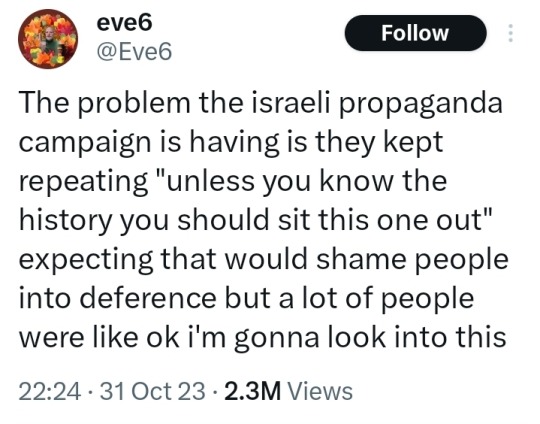
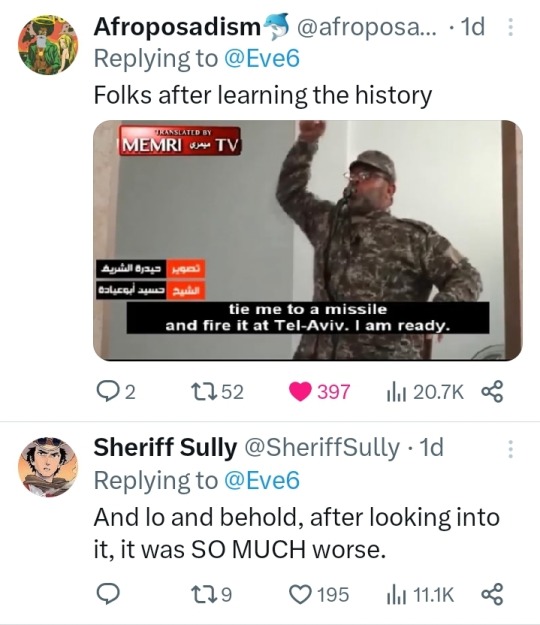

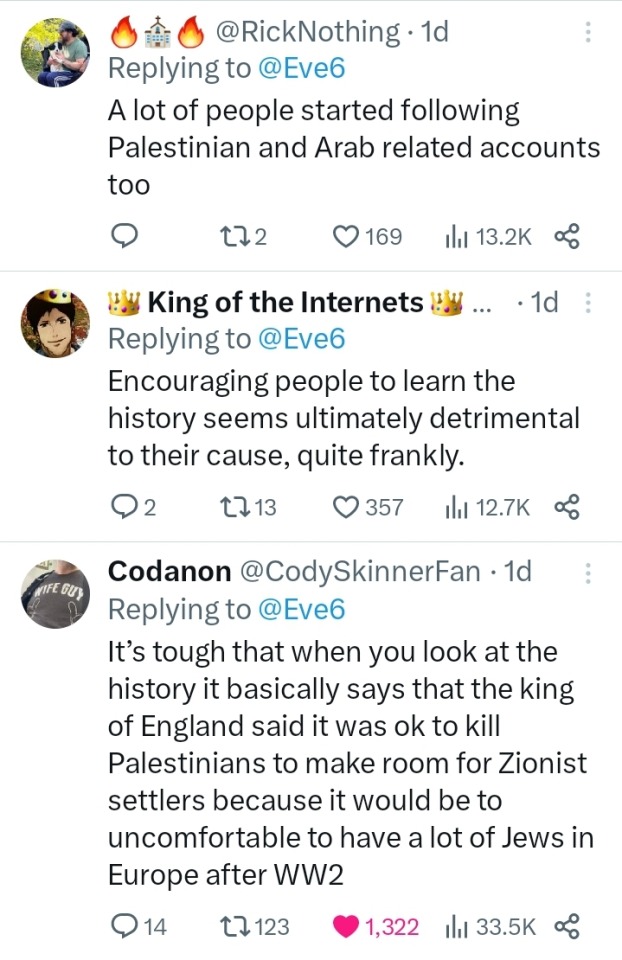
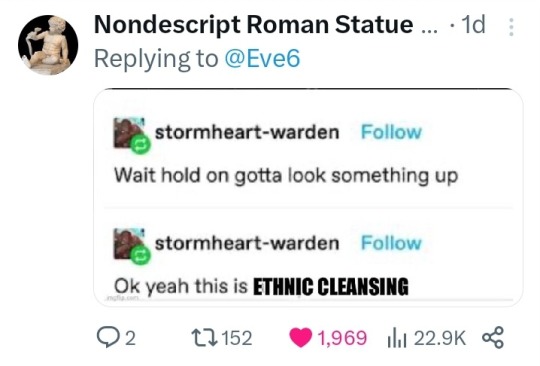
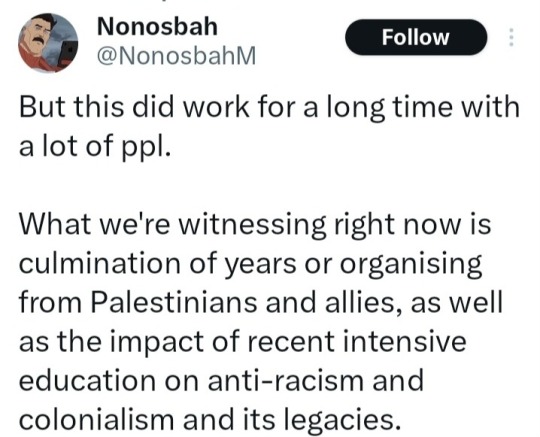
The Big Damn List Of Stuff They Said You Didn't Know
(Yes, it's a lot. Just choose your preferred medium and then pick one.)
Podcasts
Backgrounders and Quick Facts
Interactive Maps
Teach-Out Resources
Reading Material (free)
Films and Documentaries (free)
Non-Governmental Organizations
Social Media
How You Can Help
Podcasts
Cocktails & Capitalism: The Story of Palestine Part 1, Part 3
It Could Happen Here: The Cheapest Land is Bought with Blood, Part 2, The Balfour Declaration
Citations Needed: Media narratives and consent manufacturing around Israel-Palestine and the Gaza Siege
The Deprogram: Free Palestine, ft. decolonizatepalestine.com.
Backgrounders and Quick Facts
The Palestine Academy: Palestine 101
Institute for Middle East Understanding: Explainers and Quick Facts
Interactive Maps
Visualizing Palestine
Teach-Out Resources
1) Cambridge UCU and Pal Society
Palestine 101
Intro to Palestine Film + Art + Literature
Resources for Organising and Facilitating)
2) The Jadaliya YouTube Channel of the Arab Studies Institute
Gaza in Context Teach-in series
War on Palestine podcast
Updates and Discussions of news with co-editors Noura Erakat and Mouin Rabbani.
3) The Palestine Directory
History (virtual tours, digital archives, The Palestine Oral History Project, Documenting Palestine, Queering Palestine)
Cultural History (Palestine Open Maps, Overdue Books Zine, Palestine Poster Project)
Contemporary Voices in the Arts
Get Involved: NGOs and campaigns to help and support.
3) PalQuest Interactive Encyclopedia of the Palestine Question.
4) The Palestine Remix by Al Jazeera
Books and Articles
Free reading material
My Gdrive of Palestine/Decolonization Literature (nearly all the books recommended below + books from other recommended lists)
Five free eBooks by Verso
Three Free eBooks on Palestine by Haymarket
LGBT Activist Scott Long's Google Drive of Palestine Freedom Struggle Resources
Recommended Reading List
Academic Books
Edward Said (1979) The Question of Palestine, Random House
Ilan Pappé (2002)(ed) The Israel/Palestine Question, Routledge
Ilan Pappé (2006) The Ethnic Cleansing of Palestine, OneWorld Publications
Ilan Pappé (2011) The Forgotten Palestinians: A History of the Palestinians in Israel, Yale University Press
Ilan Pappé (2015) The Idea of Israel: A History of Power and Knowledge, Verso Books
Ilan Pappé (2017) The Biggest Prison On Earth: A History Of The Occupied Territories, OneWorld Publications
Ilan Pappé (2022) A History of Modern Palestine, Cambridge University Press
Rosemary Sayigh (2007) The Palestinians: From Peasants to Revolutionaries, Bloomsbury
Andrew Ross (2019) Stone Men: the Palestinians who Built Israel, Verso Books
Rashid Khalidi (2020) The Hundred Years’ War on Palestine: A History of Settler Colonialism and Resistance 1917–2017
Ariella Azoulay (2011) From Palestine to Israel: A Photographic Record of Destruction and State Formation, 1947-1950, Pluto Press
Ariella Azoulay and Adi Ophir (2012) The One-State Condition: Occupation and Democracy in Israel/Palestine, Stanford University Press.
Jeff Halper (2010) An Israeli in Palestine: Resisting Dispossession, Redeeming Israel, Pluto Press
Jeff Halper (2015) War Against the People: Israel, the Palestinians and Global Pacification
Jeff Halper (2021) Decolonizing Israel, Liberating Palestine: Zionism, Settler Colonialism, and the Case for One Democratic State, Pluto Press
Anthony Loewenstein (2023) The Palestine Laboratory: How Israel exports the Technology of Occupation around the World
Noura Erakat (2019) Justice for Some: Law and the Question of Palestine, Stanford University Press
Neve Gordon (2008) Israel’s Occupation, University of California Press
Joseph Massad (2006) The Persistence of the Palestinian Question: Essays on Zionism and the Palestinians, Routledge
Memoirs
Edward Said (1986) After the Last Sky: Palestine Lives, Columbia University PEdward Saidress
Edward Said (2000) Out of Place; A Memoir, First Vintage Books
Mourid Barghouti (2005) I saw Ramallah, Bloomsbury
Hatim Kanaaneh (2008) A Doctor in Galilee: The Life and Struggle of a Palestinian in Israel, Pluto Press
Raja Shehadeh (2008) Palestinian Walks: Into a Vanishing Landscape, Profile Books
Ghada Karmi (2009) In Search of Fatima: A Palestinian Story, Verso Books
Vittorio Arrigoni (2010) Gaza Stay Human, Kube Publishing
Ramzy Baroud (2010) My Father Was a Freedom Fighter: Gaza's Untold Story, Pluto Press
Izzeldin Abuelaish (2011) I Shall Not Hate: A Gaza Doctor’s Journey on the Road to Peace and Human Dignity, Bloomsbury
Atef Abu Saif (2015) The Drone Eats with Me: A Gaza Diary, Beacon Press
Anthologies
Voices from Gaza - Insaniyyat (The Society of Palestinian Anthropologists)
Letters From Gaza • Protean Magazine
Salma Khadra Jayyusi (1992) Anthology of Modern Palestinian Literature, Columbia University Press
ASHTAR Theatre (2010) The Gaza Monologues
Refaat Alreer (ed) (2014) Gaza Writes Back, Just World Books
Refaat Alreer, Laila El-Haddad (eds) (2015) Gaza Unsilenced, Just World Books
Cate Malek and Mateo Hoke (eds)(2015) Palestine Speaks: Narrative of Life under Occupation, Verso Books
Jehad Abusalim, Jennifer Bing (eds) (2022) Light in Gaza: Writings Born of Fire, Haymarket Books
Short Story Collections
Ghassan Kanafani, Hilary Kilpatrick (trans) (1968) Men in the Sun and Other Palestinian Stories, Lynne Rienner Publishers
Ghassan Kanafani, Barbara Harlow, Karen E. Riley (trans) (2000) Palestine’s Children: Returning to Haifa and Other Stories, Lynne Rienner Publishers
Atef Abu Saif (2014) The Book of Gaza: A City in Short Fiction, Comma Press
Samira Azzam, Ranya Abdelrahman (trans) (2022) Out Of Time: The Collected Short Stories of Samira Azzam
Sonia Sulaiman (2023) Muneera and the Moon; Stories Inspired by Palestinian Folklore
Essay Collections
Edward W. Said (2000) Reflections on Exile and Other Essays, Harvard University Press
Salim Tamari (2008) Mountain against the Sea: Essays on Palestinian Society and Culture, University of California Press
Fatma Kassem (2011) Palestinian Women: Narratives, histories and gendered memory, Bloombsbury
Ramzy Baroud (2019) These Chains Will Be Broken: Palestinian Stories of Struggle and Defiance in Israeli Prisons, Clarity Press
Novels
Sahar Khalifeh (1976) Wild Thorns, Saqi Books
Liyana Badr (1993) A Balcony over the Fakihani, Interlink Books
Hala Alyan (2017) Salt Houses, Harper Books
Susan Abulhawa (2011) Mornings in Jenin, Bloomsbury
Susan Abulhawa (2020) Against the Loveless World, Bloomsbury
Graphic novels
Joe Sacco (2001) Palestine
Joe Sacco (2010) Footnotes in Gaza
Naji al-Ali (2009) A Child in Palestine, Verso Books
Mohammad Sabaaneh (2021) Power Born of Dreams: My Story is Palestine, Street Noise Book*
Poetry
Fady Joudah (2008) The Earth in the Attic, Sheridan Books,
Ghassan Zaqtan, Fady Joudah (trans) (2012) Like a Straw Bird It Follows Me and Other Poems, Yale University Press
Hala Alyan (2013) Atrium: Poems, Three Rooms Press*
Mohammed El-Kurd (2021) Rifqa, Haymarket Books
Mosab Abu Toha (2022) Things You May Find Hidden in My Ear: Poems from Gaza, City Lights Publishers
Tawfiq Zayyad (2023) We Are Here to Stay, Smokestack Books*
The Works of Mahmoud Darwish
Poems
Rafeef Ziadah (2011) We Teach Life, Sir
Nasser Rabah (2022) In the Endless War
Refaat Alareer (2011) If I Must Die
Hiba Abu Nada (2023) I Grant You Refuge/ Not Just Passing
[All books except the ones starred are available in my gdrive. I'm adding more each day. But please try and buy whatever you're able or borrow from the library. Most should be available in the discounted Free Palestine Reading List by Pluto Press, Verso and Haymarket Books.]
Human Rights Reports & Documents
Information on current International Court of Justice case on ‘Legal Consequences arising from the Policies and Practices of Israel in the Occupied Palestinian Territory, including East Jerusalem’
UN Commission of Inquiry Report 2022
UN Special Rapporteur Report on Apartheid 2022
Amnesty International Report on Apartheid 2022
Human Rights Watch Report on Apartheid 2021
Report of the United Nations Fact-Finding Mission on the Gaza Conflict’ 2009 (‘The Goldstone Report’)
Advisory Opinion on the Legal Consequences of the Construction of a Wall in the Occupied Palestinian Territory, International Court of Justice, 9 July 2004
Films
Documentaries
Jenin, Jenin (2003) dir. Mohammed Bakri
Massacre (2005) dir. Monica Borgmann, Lokman Slim, Hermann Theissen
Slingshot HipHop (2008) dir. Jackie Reem Salloum
Waltz with Bashir (2008) dir. Ari Folman † (also on Amazon Prime)
Tears of Gaza (2010) dir. Vibeke Løkkeberg (also on Amazon Prime)
5 Broken Cameras (2011) dir. Emad Burnat (also on Amazon Prime)
The Gatekeepers (2012) dir. Dror Moreh (also on Amazon Prime)
The Great Book Robbery (2012) | Al Jazeera English
Al Nakba (2013) | Al Jazeera (5-episode docu-series)
The Village Under the Forest (2013) dir. Mark J. Kaplan
Where Should The Birds Fly (2013) dir. Fida Qishta
Naila and the Uprising (2017) (also on Amazon Prime)
GAZA (2019) dir. Andrew McConnell and Garry Keane
Gaza Fights For Freedom (2019) dir. Abby Martin
Little Palestine: Diary Of A Siege (2021) dir. Abdallah Al Khatib
Palestine 1920: The Other Side of the Palestinian Story (2021) | Al Jazeera World Documentary
Gaza Fights Back (2021) | MintPress News Original Documentary | dir. Dan Cohen
Innocence (2022) dir. Guy Davidi
Short Films
Fatenah (2009) dir. Ahmad Habash
Gaza-London (2009) dir. Dina Hamdan
Condom Lead (2013) dir. Tarzan Nasser, Arab Nasser
OBAIDA (2019) | Defence for Children Palestine
Theatrical Films
Divine Intervention (2002) | dir. Elia Suleiman (also on Netflix)
Paradise Now (2005) dir Hany Abu-Assad (also on Amazon Prime)
Lemon Tree (2008) (choose auto translate for English subs) (also on Amazon Prime)
It Must Be Heaven (2009) | dir. Elia Suleiman †
The Promise (2010) mini-series dir. Peter Kosminsky (Part 1, Part 2, Part 3, Part 4)
Habibi (2011)* dir. Susan Youssef
Omar (2013)* dir. Hany Abu-Assad †
3000 Nights (2015)* dir. Mai Masri
Foxtrot (2017) dir. Samuel Maoz (also on Amazon Prime)
The Time that Remains (2019) dir. Elia Suleiman †
Gaza Mon Amour (2020) dir. Tarzan Nasser, Arab Nasser †
The Viewing Booth (2020) dir. Ra'anan Alexandrowicz (on Amazon Prime and Apple TV)
Farha (2021)* | dir. Darin J. Sallam
Palestine Film Institute Archive
All links are for free viewing. The ones marked with a star (*) can be found on Netflix, while the ones marked † can be downloaded for free from my Mega account.
If you find Guy Davidi's Innocence anywhere please let me know, I can't find it for streaming or download even to rent or buy.
In 2018, BDS urged Netflix to dump Fauda, a series created by former members of IOF death squads that legitimizes and promotes racist violence and war crimes, to no avail. Please warn others to not give this series any views. BDS has not called for a boycott of Netflix. ]
Planning to link two separate posts here listing all the books in my drive and all the films I couldn't include here. Check back for updates.
NGOs
The Boycott, Divestment, Sanctions (BDS) Movement
Medical Aid for Palestinians
Euro-Mediterranean Human Rights Monitor
Palestine Defence for Children International
Palestinian Feminist Collective
Al-Shabaka: The Palestinian Policy Network
Addameer Prisoner Support and Human Rights Association
Institute for Palestine Studies
Al Haq
Artists for Palestine
The Palestine Museum
Jewish Currents
B’Tselem
DAWN
Social Media
Palestnians on Tumblr
@el-shab-hussein
@killyfromblame
@apollos-olives
@fairuzfan
@palipunk
@sar-soor
@nabulsi
@ibtisams
@wearenotjustnumbers2
@90-ghost (is in Gaza right now. Please donate to his GFM and boost it.)
@tamarrud
Allies and advocates (not Palestinian)
@bloglikeanegyptian beautiful posts that read like op-eds
@vyorei daily news roundups
@luthienne resistance through prose
@decolonize-the-left scoop on the US political plans and impacts
@feluka
(Please don't expect any of these blogs to be completely devoted to Palestine allyship; they do post regularly about it but they're still personal blogs and post whatever else they feel like. Do not harrass them.)
Gaza journalists
Motaz Azaiza IG: @motaz_azaiza | Twitter: @azaizamotaz9 | TikTok: _motaz.azaiza (left Gaza as of Jan 23)
Bisan Owda IG and TikTok: wizard_bisan1 | Twitter: @wizardbisan
Saleh Aljafarawi IG: @saleh_aljafarawi | Twitter: @S_Aljafarawi | TikTok: @saleh_aljafarawi97
Plestia Alaqad IG: @byplestia | TikTok: @plestiaaqad (left Gaza)
Wael Al-Dahdouh IG: @wael_eldahdouh | Twitter: @WaelDahdouh (left Gaza as of Jan 13)
Hind Khoudary IG: @hindkhoudary | Twitter: @Hind_Gaza
Ismail Jood IG and TikTok: @ismail.jood (announced end of coverage on Jan 25)
Yara Eid IG: @eid_yara | Twitter: @yaraeid_
Eye on Palestine IG: @eye.on.palestine | Twitter: @EyeonPalestine | TikTok: @eyes.on.palestine
Muhammad Shehada Twitter: @muhammadshehad2
(Edit: even though some journos have evacuated, the footage up to the end of their reporting is up on their social media, and they're also doing urgent fundraisers to get their families and friends to safety. Please donate or share their posts.)
News organisations
The Electronic Intifada Twitter: @intifada | IG: @electronicintifada
Quds News Network Twitter and Telegram: @QudsNen | IG: @qudsn (Arabic)
Times of Gaza IG: @timesofgaza | Twitter: @Timesofgaza | Telegram: @TIMESOFGAZA
The Palestine Chronicle Twitter: @PalestineChron | IG: @palestinechron | @palestinechronicle
Al-Jazeera Twitter: @AJEnglish | IG and TikTok: @aljazeeraenglish, @ajplus
Middle East Eye IG and TikTok: @middleeasteye | Twitter: @MiddleEastEye
Democracy Now Twitter and IG: @democracynow TikTok: @democracynow.org
Haaretz* Twitter: @Haaretz | IG: haaretzcom
Mondoweiss IG and TikTok: @mondoweiss | Twitter: @Mondoweiss
The Intercept Twitter and IG: @theintercept
MintPress Twitter: @MintPressNews | IG: mintpress
Novara Media Twitter and IG: @novaramedia
Truthout Twitter and IG: @truthout
[*Please note that Haaretz is an Israeli Liberal Zionist newspaper and heavily propagandized against Palestine. It's included here only as a Zionist critic of the Israeli government and IDF from within Israel.]
Palestnians on Other Social Media
Mouin Rabbani: Middle East analyst specializing in the Arab-Israeli conflict and Palestinian affairs. Twitter: @MouinRabbani
Noura Erakat: Legal scholar, human rights attorney, specialising in Israeli–Palestinian conflict. Twitter: @4noura | IG: @nouraerakat | (http://www.nouraerakat.com/)
Hebh Jamal: Journalist in Germany. IG and Twitter: @hebh_jamal
Ghada Sasa: PhD candidate in International Relations, green colonialism, and Islam in Canada. Twitter: @sasa_ghada | IG: @ghadasasa48
Taleed El Sabawi: Assistant professor of law and researcher in public health. Twitter: @el_sabawi | IG
Lexi Alexander: Filmmaker and activist. Twitter: @LexiAlex | IG: @lexialexander1
Mariam Barghouti: Writer, blogger, researcher, and journalist. Twitter: @MariamBarghouti | IG: @mariambarghouti
Rasha Abdulhadi: Queer poet, author and cultural organizer. Twitter: @rashaabdulhadi
Mohammed el-Kurd: Writer and activist from Jerusalem. IG: @mohammedelkurd | Twitter: @m7mdkurd
Ramy Abdu: Founder and Chairman of the Euro-Mediterranean Human Rights Monitor. Twitter: @RamyAbdu
Subhi: Founder of The Palestine Academy website. IG: @sbeih.jpg |TikTok @iamsbeih | Twitter: @iamsbeih
Allies
Lowkey (Kareem Dennis): Rapper, activist, video and podcast host for MintPress. Twitter: @LowkeyOnline IG: @lowkeyonline
Francesca Albanese: UN Special Rapporteur on the Occupied Territories. Twitter: @FranceskAlbs
Sana Saeed: Journalist and media critic, host and senior producer at Al-Jazeera Plus. IG: @sanaface | Twitter: @SanaSaeed
Shailja Patel: Poet, playwright, activist, founding member of Kenyans For Peace, Truth and Justice. Twitter: @shailjapatel
Jairo I. Fúnez-Flores: Researcher in curriculum studies, decolonial theory, social movements. Twitter: @Jairo_I_Funez
Jack Dodson: Journalist and Filmmaker. Twitter: @JackDodson IG: @jdodson4
Imani Barbarin: Writer, public speaker, and disability rights activist. IG: @crutches_and_spice | Twitter: @Imani_Barbarin | TikTok: @crutches_and_spice
Jewish Allies
Katie Halper: US comedian, writer, filmmaker, podcaster, and political commentator. IG and Twitter: @kthalps
Amanda Gelender: Writer. Twitter: @agelender | (https://agelender.medium.com/)
Yoav Litvin: Jerusalem-born Writer and Photographer. IG and Twitter: @nookyelur | (yoavlitvin.com)
Alana Lentin: Professor of Cultural and Social Analysis at Western Sydney University. Twitter: @alanalentin
Gideon Levy: anti-Zionist Israeli journalist and activist. Twitter: @gideonle
How You Can Help Palestine
How to be an Ally 101
URGENT‼️📢: Global Strike Guide
If any links are broken let me know. Or pull up the current post to check whether it's fixed.
"Knowledge is Israel's worst enemy. Awareness is Israel's most hated and feared foe. That's why Israel bombs a university: it wants to kill openness and determination to refuse living under injustice and racism."
— Dr. Refaat Alareer, (martyred Dec 6, 2023)
From River To The Sea Palestine Will Be Free 🇵🇸🇵🇸🇵🇸
-----
Edit 1: took the first video down because turns out the animator is a terf and it links to her blog. Really sorry for any distress.
Edit 2: All recommended readings + Haymarket recommendations + essential decolonization texts have been uploaded to my linked gdrive. I will adding more periodically. Please do buy or check them out from the library if possible, but this post was made for and by poor and gatekept Global South bitches like me.
Some have complained about the memes being disrespectful. You're actually legally obligated to make fun of Israeli propaganda and Zionists. I don't make the rules.
Edit 3: "The river to the sea" does not mean the expulsion of Jews from Palestine. Believing that is genocide apologia.
Edit 4: Gazans have specifically asked us to put every effort into pushing for a ceasefire instead of donations. "Raising humanitarian aid" is a grift Western governments are pushing right now to deflect from the fact that they're sending billions to Israel to keep carpet bombing Gazans. As long as the blockades are still in place there will never be enough aid for two million people. (UPDATE: PLEASE DONATE to the Gazan's GoFundMe fundraisers to help them buy food and get out of Rafah into Egypt. E-SIMs, food and medical supplies are also essential. Please donate to the orgs linked in the How You Can Help. Go on the strikes. DO NOT STOP PROTESTING.)
Edit 5: Google drive link for academic books folder has been fixed. Also have added a ton of resources to all the other folders so please check them out.
Edit 6: Added interactive maps, Jadaliya channel, and masterlists of donation links and protest support and of factsheets.
The twitter accounts I reposted as it was given to me and I just now realized it had too many Israeli voices and almost none of the Palestinians I'm following, so it's being edited. Check back for more. I also removed sources like Jewish Voices of Peace and Breaking the Silence that do good work but have come under fair criticism from Palestinians.
Edit 7: Complete reformatting
Edit 8: Complete revamping of the social media section. It now reflects my own following list.
Edit 9: removed some more problematic people from the allies list. Remember that the 2SS is a grift that's used to normalize violence and occupation, kids. Supporting the one-state solution is lowest possible bar for allyship. It's "Free Palestine" not "Free half of Palestine and hope Israel doesn't go right back to killing them".
Edit 10: added The Palestine Directory + Al Jazeera documentary + Addameer. This "100 links per post" thing sucks.
Edit 11: more documentaries and films
Edit 12: reformatted reading list
Edit 13: had to remove @palipunk's masterlist to add another podcast. It's their pinned post and has more resources Palestinian culture and crafts if you want to check it out
#free palestine#palestine resources#palestine reading list#decolonization#israel palestine conflict#israel palestine war#british empire#american imperialism#apartheid#social justice#middle east history#MENA#arab history#anti zionism#palestinian art#palestinian history#palestinian culture#palestinian genocide#al nakba#ethnic cleansing#war crimes#racism#imperialism#colonialism#british colonialism#knee of huss#ask to tag#Youtube
72K notes
·
View notes
Text
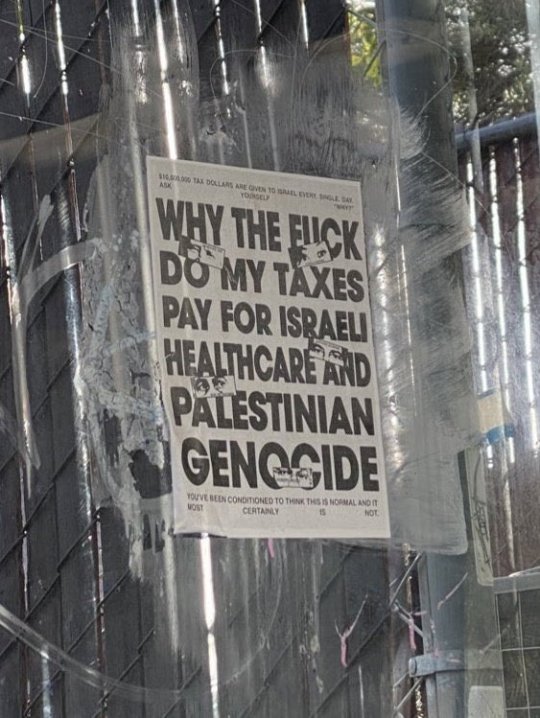
Oakland, California
#Oakland#California#free gaza#palestine genocide#i stand with palestine#free palestine#gazaunderattack#gaza genocide#gaza strip#gaza#israel#israel is committing genocide#israel palestine conflict#usa news#usa politics#joe biden#israel is a terrorist state#politics#aaron bushnell
43K notes
·
View notes
